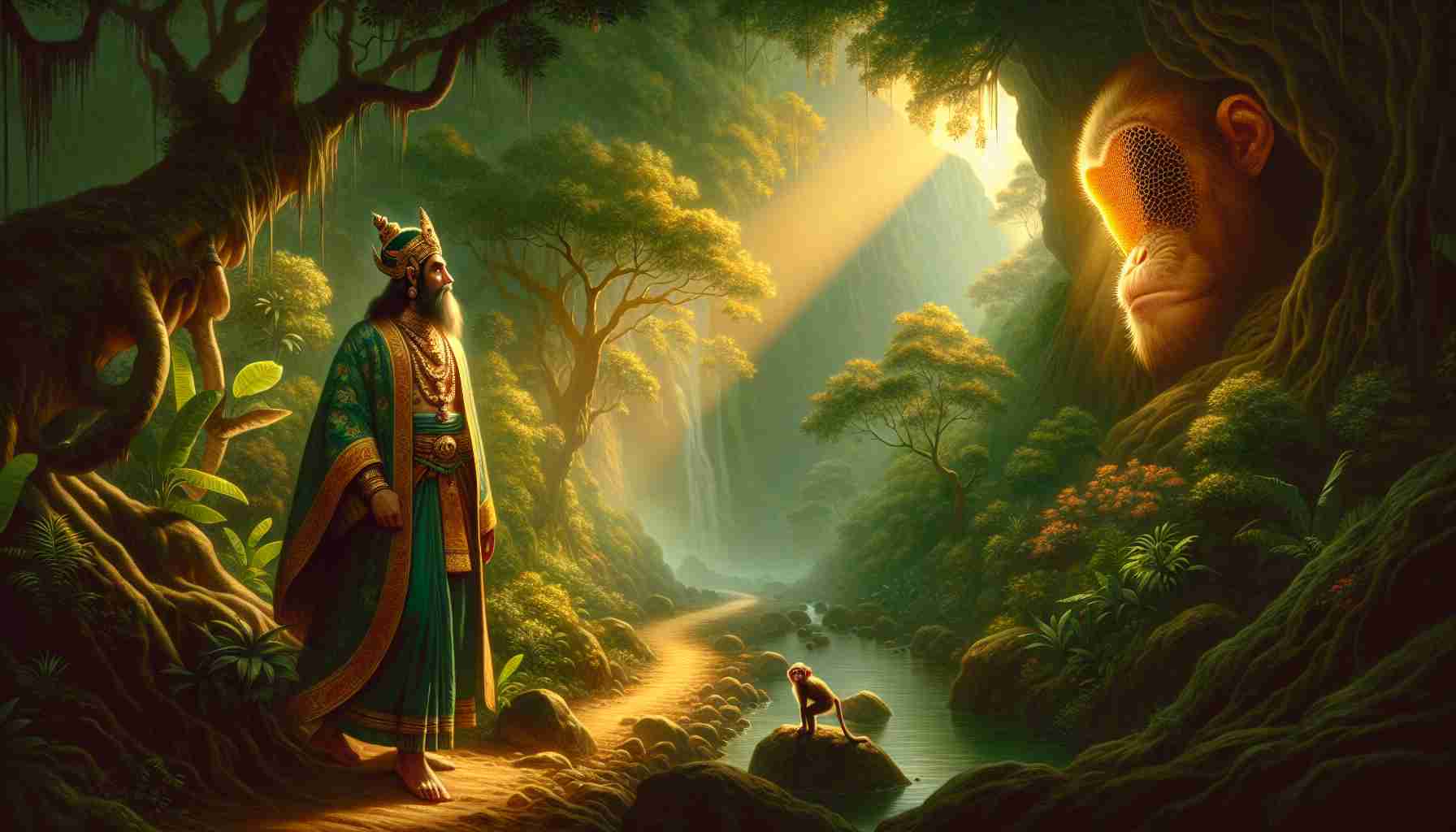

You won’t find my name in any scroll, but I was there—on that narrow forest path beneath the golden rays of a sun that barely pierced the thick canopy above. I was just another traveler seeking shade and water, making my way through the jungle valley not far from the River Ganga, where Emperor Brahmadatta’s hunting party passed one fateful day.
The emperor, Brahmadatta of Benares, was a powerful ruler known for his wisdom and wealth, though he was often led by desire more than restraint. That day, he and his entourage were hunting in the jungle when a fierce chase separated him from his men. Exhausted, covered in sweat and dirt, the mighty king stumbled through the dense trees in search of water and relief.
That was when he saw the monkey.
Now, this was no ordinary monkey. He was the leader of a large band, living high in the forest trees. Though wild in appearance, he moved with grace and eyes much older than his years. This monkey, a Bodhisattva—a being striving to become a Buddha—had chosen to be reborn in this form to teach by example, even if no words were spoken.
The monkey saw the suffering king and, without a moment of fear or hesitation, dropped from the branches carrying a simple honeycomb in his hand. It was a gift. Sticky and golden, taken fresh from the hive that buzzed near the treetop. Climbing down, he gently placed it on a rock a few steps in front of the startled king.
Brahmadatta stared, wide-eyed. His royal robes were torn, his pride stung. Here, an animal showed him more compassion than many men. The monkey bowed, then disappeared into the leaves.
The king tasted the honey. It was sweet, so much sweeter than any banquet dish or palace treat. But something deeper stirred in him. How could a creature with nothing offer something so pure, so selfless?
Later, when reunited with his guards, Brahmadatta commanded they return to the spot. "I must see the monkey again," he said. "I must honor him properly." But they searched in vain. The monkey was gone.
Back in Benares, the king could not forget. It haunted him—not the monkey’s face, but his act. No demand. No fear. No expectation. Just a simple gift.
From that day, King Brahmadatta changed. He gave generously, not for praise but from compassion. He listened more and ruled with a gentler heart. He shared with the poor, helped the sick, and spoke often of a monkey in the woods who had reminded him of what it meant to give without attachment.
And as for me—I carried that story from village to village, temple to temple, so others might hear it. Some laughed, some wept, but all listened.
That day, I realized the true meaning of mindfulness and compassion. The monkey asked for nothing—and still changed everything.
You won’t find my name in any scroll, but I was there—on that narrow forest path beneath the golden rays of a sun that barely pierced the thick canopy above. I was just another traveler seeking shade and water, making my way through the jungle valley not far from the River Ganga, where Emperor Brahmadatta’s hunting party passed one fateful day.
The emperor, Brahmadatta of Benares, was a powerful ruler known for his wisdom and wealth, though he was often led by desire more than restraint. That day, he and his entourage were hunting in the jungle when a fierce chase separated him from his men. Exhausted, covered in sweat and dirt, the mighty king stumbled through the dense trees in search of water and relief.
That was when he saw the monkey.
Now, this was no ordinary monkey. He was the leader of a large band, living high in the forest trees. Though wild in appearance, he moved with grace and eyes much older than his years. This monkey, a Bodhisattva—a being striving to become a Buddha—had chosen to be reborn in this form to teach by example, even if no words were spoken.
The monkey saw the suffering king and, without a moment of fear or hesitation, dropped from the branches carrying a simple honeycomb in his hand. It was a gift. Sticky and golden, taken fresh from the hive that buzzed near the treetop. Climbing down, he gently placed it on a rock a few steps in front of the startled king.
Brahmadatta stared, wide-eyed. His royal robes were torn, his pride stung. Here, an animal showed him more compassion than many men. The monkey bowed, then disappeared into the leaves.
The king tasted the honey. It was sweet, so much sweeter than any banquet dish or palace treat. But something deeper stirred in him. How could a creature with nothing offer something so pure, so selfless?
Later, when reunited with his guards, Brahmadatta commanded they return to the spot. "I must see the monkey again," he said. "I must honor him properly." But they searched in vain. The monkey was gone.
Back in Benares, the king could not forget. It haunted him—not the monkey’s face, but his act. No demand. No fear. No expectation. Just a simple gift.
From that day, King Brahmadatta changed. He gave generously, not for praise but from compassion. He listened more and ruled with a gentler heart. He shared with the poor, helped the sick, and spoke often of a monkey in the woods who had reminded him of what it meant to give without attachment.
And as for me—I carried that story from village to village, temple to temple, so others might hear it. Some laughed, some wept, but all listened.
That day, I realized the true meaning of mindfulness and compassion. The monkey asked for nothing—and still changed everything.